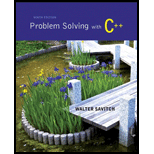
Concept explainers
You have collected a file of movie ratings where each movie is rated from 1 (bad) to 5 (excellent). The first line of the file is a number that identifies how many ratings are in the file. Each rating then consists of two lines: the name of the movie followed by the numeric rating from 1 to 5. Here is a sample rating file with four unique movies and seven ratings:
| 7 Harry Potter and the Order of the Phoenix 4 Harry Potter and the Order of the Phoenix 5 The Bourne Ultimatum 3 Harry Potter and the Order of the Phoenix 4 The Bourne Ultimatum 4 Wall-E 4 Glitter 1 |
Write a
| Glitter: 1 review, average of 1 / 5 Harry Potter and the Order of the Phoenix: 3 reviews, average of 4.3 / 5 The Bourne Ultimatum: 2 reviews, average of 3.5 / 5 Wall–E: 1 review, average of 4 / 5 |
Use a map or multiple maps to calculate the output. Your map(s) should index from a string representing each movie’s name to integers that store the number of reviews for the movie and the sum of the ratings for the movie.
Want to see the full answer?
Check out a sample textbook solution
Chapter 18 Solutions
Problem Solving with C++ plus MyProgrammingLab with Pearson eText-- Access Card Package (9th Edition)
Additional Engineering Textbook Solutions
INTERNATIONAL EDITION---Engineering Mechanics: Statics, 14th edition (SI unit)
Mechanics of Materials (10th Edition)
SURVEY OF OPERATING SYSTEMS
Java: An Introduction to Problem Solving and Programming (8th Edition)
Web Development and Design Foundations with HTML5 (8th Edition)
Starting Out with Programming Logic and Design (5th Edition) (What's New in Computer Science)
 C++ Programming: From Problem Analysis to Program...Computer ScienceISBN:9781337102087Author:D. S. MalikPublisher:Cengage Learning
C++ Programming: From Problem Analysis to Program...Computer ScienceISBN:9781337102087Author:D. S. MalikPublisher:Cengage Learning EBK JAVA PROGRAMMINGComputer ScienceISBN:9781337671385Author:FARRELLPublisher:CENGAGE LEARNING - CONSIGNMENTNp Ms Office 365/Excel 2016 I NtermedComputer ScienceISBN:9781337508841Author:CareyPublisher:Cengage
EBK JAVA PROGRAMMINGComputer ScienceISBN:9781337671385Author:FARRELLPublisher:CENGAGE LEARNING - CONSIGNMENTNp Ms Office 365/Excel 2016 I NtermedComputer ScienceISBN:9781337508841Author:CareyPublisher:Cengage- COMPREHENSIVE MICROSOFT OFFICE 365 EXCEComputer ScienceISBN:9780357392676Author:FREUND, StevenPublisher:CENGAGE L
 Microsoft Visual C#Computer ScienceISBN:9781337102100Author:Joyce, Farrell.Publisher:Cengage Learning,
Microsoft Visual C#Computer ScienceISBN:9781337102100Author:Joyce, Farrell.Publisher:Cengage Learning, Programming with Microsoft Visual Basic 2017Computer ScienceISBN:9781337102124Author:Diane ZakPublisher:Cengage Learning
Programming with Microsoft Visual Basic 2017Computer ScienceISBN:9781337102124Author:Diane ZakPublisher:Cengage Learning





